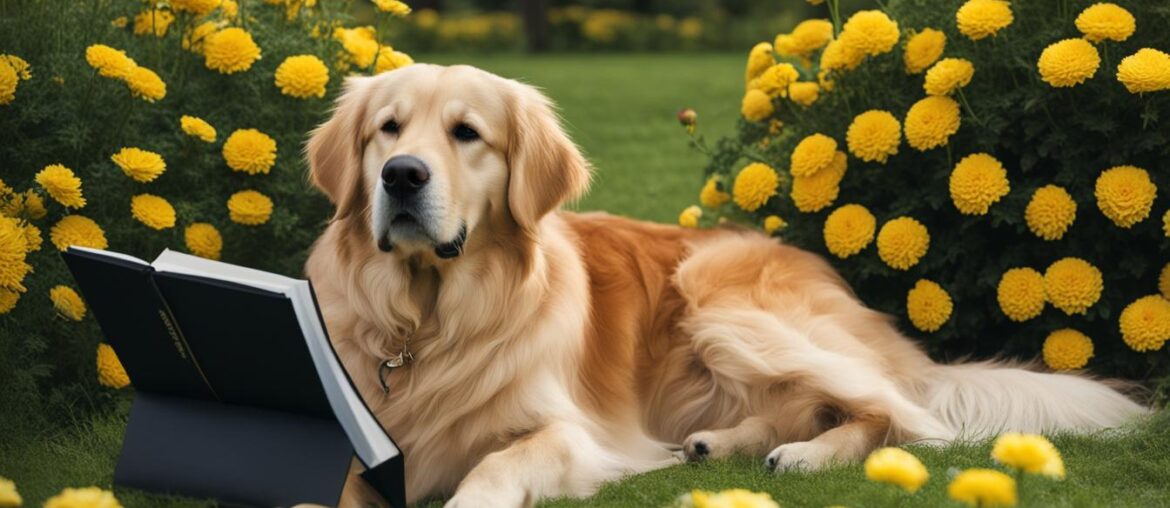As a responsible dog owner, it’s important to be aware of potential dangers that can harm our furry friends. One such concern is the toxicity of certain plants, including mums, also known as chrysanthemums. While they may be beautiful additions to our gardens, mums can be toxic to dogs if ingested.
Consumption of mums can lead to various symptoms in dogs, such as vomiting, diarrhea, drooling, and incoordination. It’s crucial to recognize these signs and take appropriate action to keep our dogs safe.
In this vet’s safety guide, I will delve into the toxicity of mums for dogs, explore the symptoms of mum poisoning, and provide tips on creating a pet-friendly garden to ensure the well-being of our beloved canine companions.
Key Takeaways:
- Mums, or chrysanthemums, can be toxic to dogs if ingested.
- Symptoms of mum poisoning in dogs include vomiting, diarrhea, drooling, and incoordination.
- There are several other common plants that can be toxic to dogs, so it is essential to be aware of them.
- Creating a pet-friendly garden with non-toxic plants is essential to keeping our dogs safe.
- If you suspect your dog has ingested mums or any other toxic plant, seek immediate veterinary care.
By understanding the potential dangers of mums and taking preventative measures, we can ensure the safety and well-being of our canine companions. Let’s dive deeper into the toxicity of mums for dogs and discover how we can create a dog-friendly garden.
Stay tuned for the next section where we’ll explore the toxicity of mums for dogs in more detail.
Understanding the Toxicity of Mums for Dogs

Mums, also known as chrysanthemums, belong to the chrysanthemum family. These flowers contain compounds that are particularly irritating and dangerous to dogs. If a dog ingests mums, it can lead to various symptoms and health issues.
The toxicity of mums can cause gastrointestinal problems in dogs, such as vomiting and diarrhea. Dogs may also experience excessive drooling and incoordination. These symptoms can range from mild to severe, depending on the amount of mums ingested and the size of the dog.
Mums are toxic to dogs, and it is important to keep them away from these flowers. If you suspect that your dog has ingested mums or is experiencing any of the symptoms mentioned, it is crucial to seek veterinary attention immediately. A veterinarian can provide the necessary treatment and care to ensure your dog’s well-being.
Other Common Toxic Plants for Dogs
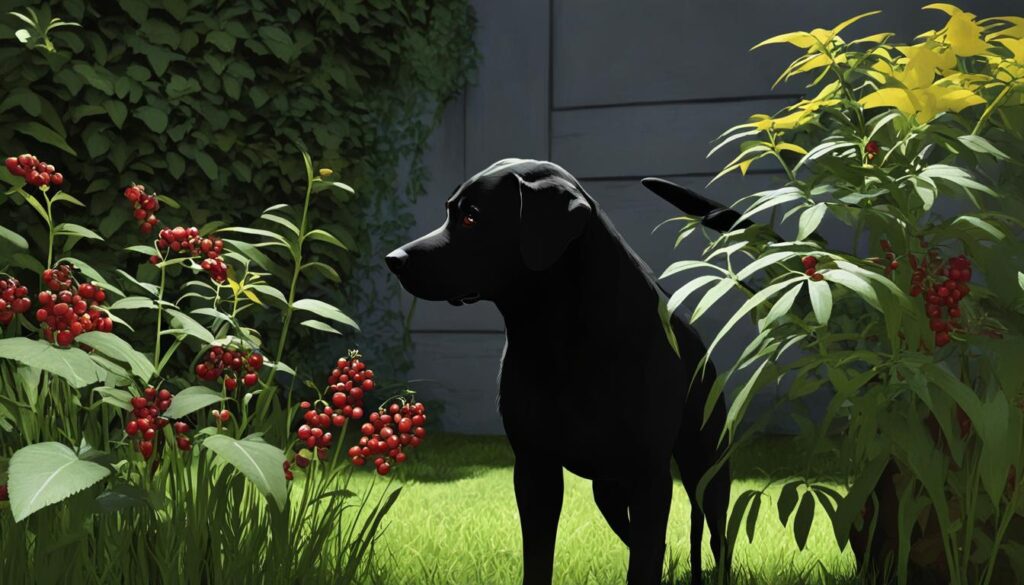
While mums are known for their toxicity to dogs, it’s important to be aware that there are other common plants that can pose a danger to our furry friends. Here are some examples:
- Azaleas: These beautiful flowering shrubs contain toxins that can harm dogs if ingested.
- Daffodils: The bulbs of daffodils contain toxic compounds that can cause vomiting, diarrhea, and even heart problems in dogs.
- Tulips: The bulbs, stems, and leaves of tulips contain toxins that can cause gastrointestinal upset in dogs.
- Sago Palms: All parts of the sago palm, including the leaves and seeds, contain toxins that can be fatal to dogs if ingested.
- Oleander: Oleander is a highly toxic plant for dogs, with all parts of the plant containing cardiac glycosides that can cause severe cardiac problems.
It is crucial to be aware of these toxic plants and ensure that your dog does not have access to them in your home or yard. Keeping your dog safe from these plants can prevent potential health issues and emergencies.
Consequences of Ingesting Toxic Plants
“Ingesting toxic plants can lead to a range of symptoms in dogs, including gastrointestinal upset, lethargy, drooling, and even organ failure. It’s important to prevent your dog from accessing these plants to avoid potential health risks.” -Dr. Emily Johnson, Veterinarian
To ensure the safety of your beloved dog, it’s crucial to be aware of the dangers that certain plants pose and take necessary precautions. By creating a pet-friendly garden and being knowledgeable about toxic plants, you can keep your furry friend safe and prevent any unwanted emergencies.
| Plant | Toxicity Level |
|---|---|
| Azaleas | High |
| Daffodils | Moderate |
| Tulips | Moderate |
| Sago Palms | High |
| Oleander | High |
Symptoms of Mum Poisoning in Dogs
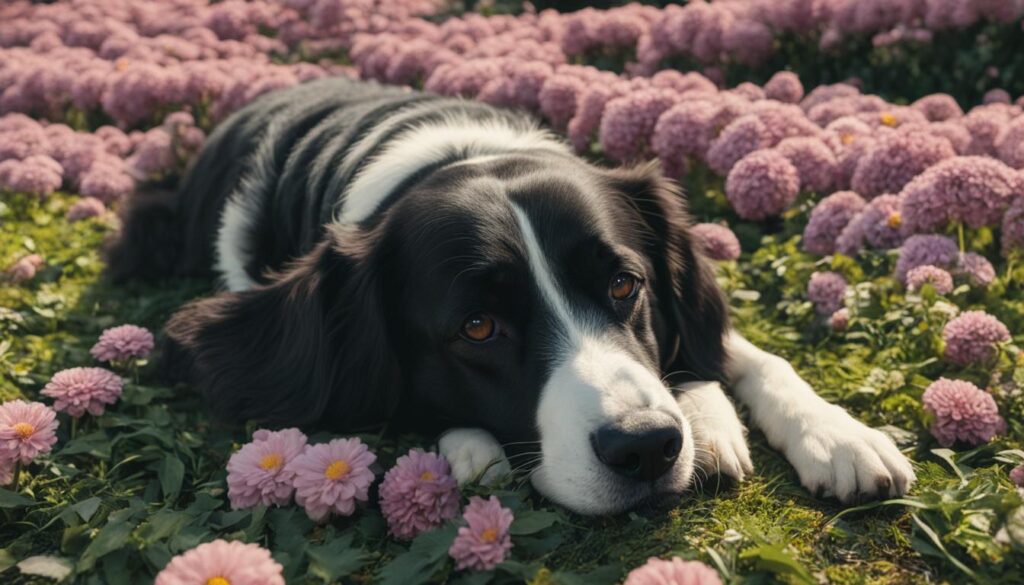
If your dog has ingested mums, it is crucial to be able to recognize the symptoms of mum poisoning. Common symptoms include:
- Vomiting
- Diarrhea
- Drooling
- Incoordination
In severe cases, mum poisoning can lead to more serious symptoms such as:
- A drop in blood pressure
- Coma
- Even death
If you notice any of these symptoms in your dog after exposure to mums, it is important to seek immediate veterinary care. Mum poisoning can have serious consequences, and prompt treatment can greatly improve your dog’s chances of recovery.
Creating a Pet-Friendly Garden

To keep your dog safe around plants, it is essential that you create a pet-friendly garden. By choosing plants that are non-toxic to dogs, you can ensure their safety and enjoyment in the outdoor space. Avoid planting toxic plants like mums, azaleas, and lilies, as these can be harmful if ingested by dogs. Instead, opt for pet-friendly plants such as marigolds, sunflowers, and petunias, which add beauty to your garden without posing a danger to your furry friend.
In addition to selecting the right plants, it’s important to take measures to prevent your dog from accessing potentially harmful areas. Securely fence off any areas where you have planted toxic plants to restrict your dog’s access. Regularly inspect your garden for any new plants or potential hazards, and remove them if necessary to create a safe environment for your pet.
Remember, a dog-friendly garden not only ensures the safety of your beloved companion but also allows them to explore and enjoy the outdoors in a worry-free manner.
Benefits of a Pet-Friendly Garden
- Provides a safe and secure environment for your dog to roam and explore.
- Prevents potential poisoning or harm from toxic plants.
- Allows your dog to enjoy the outdoors without constant supervision.
- Adds beauty and vibrancy to your outdoor space with pet-friendly plants.
What to Do If Your Dog Ingests Mums
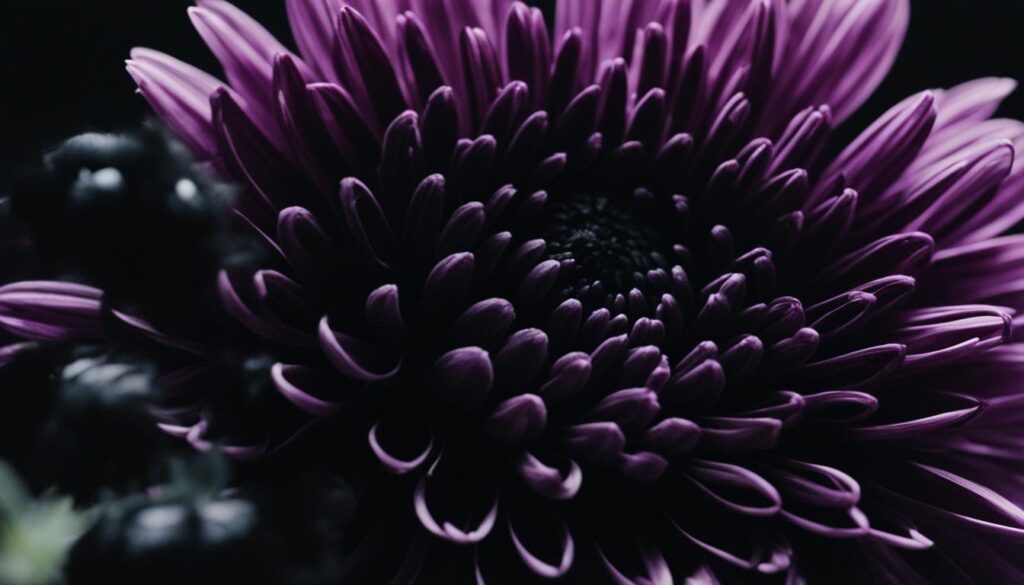
If you suspect that your dog has ingested mums, it is crucial to take immediate action. Contact your veterinarian or a pet poison control hotline for guidance. Provide them with information about the situation, including the amount and type of mums your dog has consumed. They will be able to advise you on the best course of action, which may include inducing vomiting, administering activated charcoal, or bringing your dog in for a thorough examination.
In case of chrysanthemum toxicity in dogs, time is of the essence. The quicker you seek professional help, the better the chances of a positive outcome for your canine companion. Your veterinarian will be able to assess the severity of the situation and take appropriate measures to minimize the effects of mum poisoning.
The Importance of Veterinary Care
If you believe your dog has been exposed to mums or any other toxic plant, it is crucial to seek veterinary care. The veterinarian will perform a thorough examination, including blood tests and possibly x-rays or ultrasounds to assess your dog’s condition. Prompt veterinary care can make a significant difference in the outcome for your dog and can help prevent potential complications.
Why Veterinary Care Is Essential
When it comes to chrysanthemum toxicity in dogs, early intervention is key. The symptoms of mum poisoning in dogs can vary in severity and may not always be immediately evident. By seeking veterinary care, you are ensuring that your dog receives the necessary medical attention to address any potential complications that may arise.
The veterinarian will conduct a comprehensive examination to evaluate your dog’s overall health and specifically assess their exposure to mums or other toxic plants. This may involve blood tests to check for any abnormalities, as well as diagnostic imaging such as x-rays or ultrasounds to detect any internal issues that may have resulted from the ingestion of toxic plants.
Preventing Further Health Risks
By seeking veterinary care promptly, you can prevent further health risks and potential complications. The veterinarian will be able to provide appropriate treatment and supportive care tailored to your dog’s condition. This may include administering medications to address symptoms, providing intravenous fluids for hydration, or even performing procedures to remove any plant material or toxins from your dog’s system.
Remember, the symptoms of mum poisoning in dogs can worsen over time if left untreated. Seeking veterinary care as soon as possible increases the chances of a positive outcome and a faster recovery for your beloved pet.
Partnering with Your Veterinarian
Your veterinarian is your trusted source of information and guidance when it comes to the health and well-being of your dog. They have the expertise and experience to assess your dog’s condition accurately and provide the necessary treatment options.
“It is crucial for pet owners to recognize the signs of chrysanthemum toxicity in dogs and promptly seek veterinary care. As veterinarians, our primary goal is to ensure the health and safety of our patients. By partnering with pet owners, we can successfully address any concerns and mitigate potential risks associated with plant ingestion.” – Dr. Sarah Mitchell, DVM
Regular visits to your veterinarian also contribute to your dog’s overall wellness. These check-ups allow your veterinarian to monitor your dog’s health, provide preventive care, and address any concerns or questions you may have about keeping dogs safe around plants.
Pet-Safe Alternatives to Mums
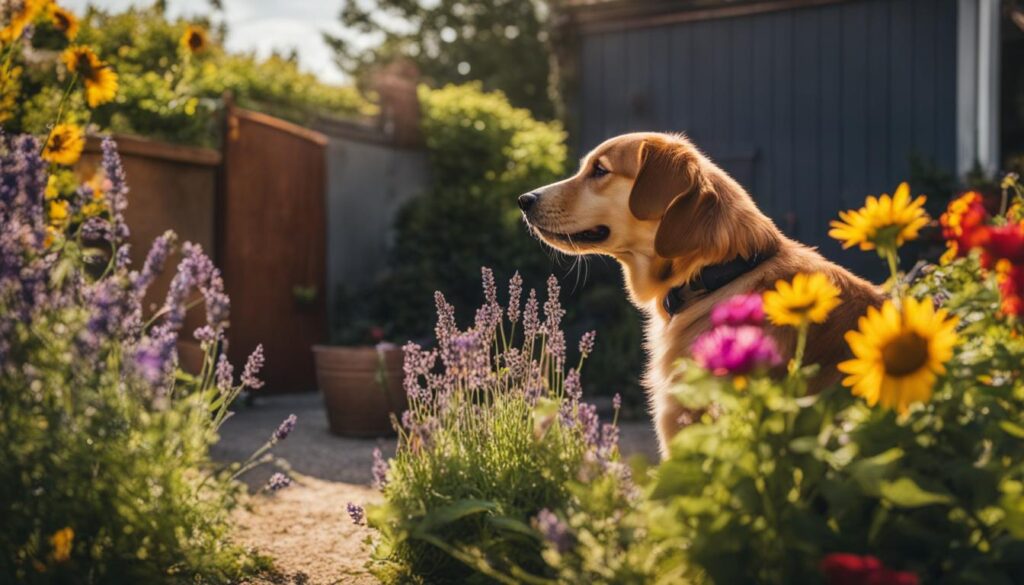
If you still want to add some floral beauty to your garden but want to avoid the toxicity of mums, there are plenty of pet-safe alternatives to consider. These dog-friendly plants can add color and vibrancy to your garden without posing a danger to your furry friends.
- Roses
- Snapdragons
- Zinnias
- Calendula
Wrapping Up
Being aware of the potential dangers that certain plants, such as mums, can pose to our beloved dogs is crucial for every dog owner. By understanding the toxicity of mums and other common toxic plants, we can take proactive steps to create a pet-friendly garden that ensures the safety and well-being of our furry friends.
If you suspect that your dog has ingested mums or any other potentially toxic plant, it is always recommended to seek veterinary care immediately. The prompt intervention of a veterinarian can make a significant difference in your dog’s health and prevent potential complications.
Remember to take proper precautions when it comes to keeping your dog safe around plants. Avoid planting toxic plants like mums, azaleas, and lilies, and instead opt for pet-friendly alternatives such as roses, snapdragons, zinnias, and calendula. By following these guidelines, you can enjoy a beautiful garden while ensuring the well-being of your canine companion.
FAQ
Are mums poisonous to dogs?
Yes, mums, also known as chrysanthemums, can be toxic to dogs.
What are the symptoms of mum poisoning in dogs?
Symptoms of mum poisoning in dogs may include vomiting, diarrhea, drooling, and incoordination.
Can dogs eat chrysanthemums?
No, dogs should not eat chrysanthemums as they can be toxic to them.
What are some other common toxic plants for dogs?
Other common toxic plants for dogs include azaleas, daffodils, tulips, sago palms, and oleander.
How can I create a pet-friendly garden?
To create a pet-friendly garden, choose plants that are non-toxic to dogs, such as marigolds, sunflowers, and petunias.
What should I do if my dog ingests mums?
If your dog ingests mums, it is important to seek veterinary care immediately and follow their advice.
Why is veterinary care important in cases of mum poisoning?
Veterinary care is important in cases of mum poisoning to assess your dog’s condition and provide appropriate treatment to prevent complications.
Are there pet-safe alternatives to mums?
Yes, there are several pet-safe alternatives to mums, such as roses, snapdragons, zinnias, and calendula.


